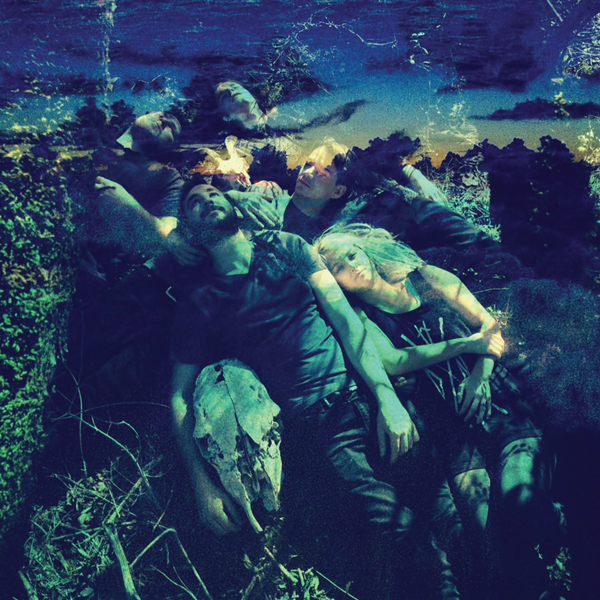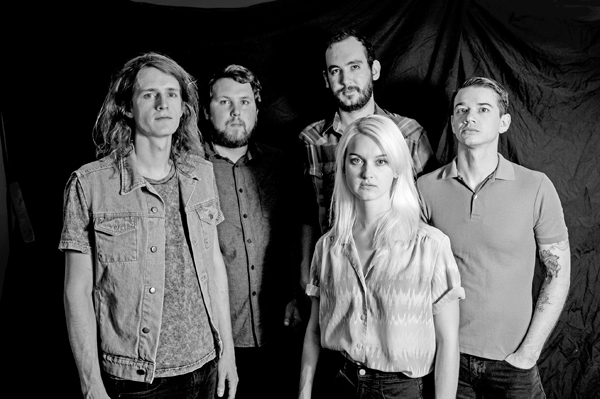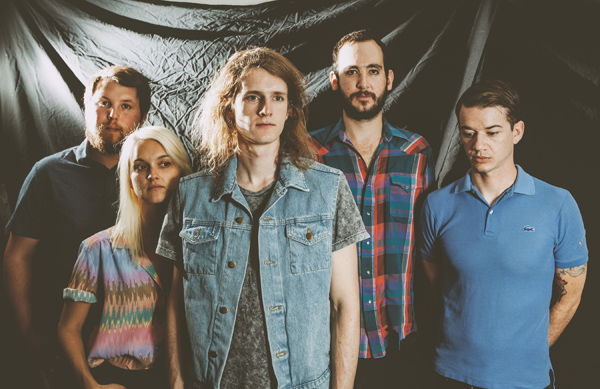Stu Baker on Reinventing Your Band While Keeping Your Lineup Intact
We recently had a chance to chat with Stu Baker, one of the leaders of Austin-based Young Tongue. The five-piece recently formed from the ashes of The Baker Family, which Stu formerly headed up with his wife Liz (now also part of Young Tongue, along with Nathan Ribner, Darryl Schomberg II, and Travis Larrew). Austinites like to “keep it weird,” and Young Tongue certainly keeps that ethos alive in their music. Oddly danceable, progressive and lyrical enveloping at the same time, we were eager to learn more about the group and their creative process. So without further ado…
How did you get your start in music, and when did you know that you wanted to pursue it seriously?
I started taking guitar lessons at 10, and it’s been my main passion in life since. I figured out in college that I wanted to take it more seriously, but had no idea what that meant. Recently I’ve come to terms with this being what I do with my life, what that means, and it feels great.
You were previously known as The Baker Family. What triggered the change to Young Tongue, and how has the transition been for you? Has anything else changed beyond the name?
The transition to the new name went great, and we’re super stoked to have a name that fits the music now. The Baker Family started out as a folk/Americana band, and over the years it mutated into what we are now. To us it was more than a name change; we essentially started a new band with the same members.
With Liz, what is your chemistry like as bandmates as opposed to husband and wife? Do you find that it’s difficult to separate the two?
We’ve always felt like having a common pursuit has kept our bond active and strong. But yeah, when we’re rehearsing or writing, it’s a different relationship for sure. The focus is on the music and songs and the five of us working together. Liz knows that I go into a bit of a different world when we’re making music, so she’s patient if I get frustrated or controlling in the rehearsal space.
Music space feels like a different realm in that the idea of marriage doesn’t necessarily exist in the same way as at home.
What is your creative process like? How do songs originate for you, and how do they grow? What type of gear do you use?
Typically I write a folk song on banjo or guitar, re-write it on guitar, bass, drums, keyboards, then show the band, and everyone takes those parts and changes them or tweaks them. Usually the original ‘parts’ for a song don’t end up in the final version. Coming up with the original idea is like finding the mouth of some trail in the woods; destroying the song, working it out, and wrangling the parts is where the real writing happens, I think. The process is different for every song, but I’d say this is the most common for our band.
What was the inspiration behind your new album Death Rattle, and how does it compare to your previous material? What was recording it like for you?
Death Rattle is definitely the most cohesive and thought-out album we’ve made. In the past, our albums and EPs just kind of documented the music we were making. Death Rattle is more of a thematic work, which took a long time to choose the songs for, piece together, and record.
Recording it was great; we worked with some killer engineers in Austin. I can’t wait to start working on the next album.
Your say that your lyrics and music create a “…sense of urgency to expose narrative.” Can you elaborate on this and explain how this concept came to take precedence during your live shows?
I don’t know exactly…but there is a sense of urgency in the music. I’ve always felt like life was super short and I needed to get what I needed to say out while I can.
It’s also been mentioned that the element of surprise is at the forefront of your shows. What was the inspiration behind it all, and how do you determine exactly what to do to establish this?
Shows without development or change are boring to me. It’s my nightmare to get up on stage and just run through some songs we wrote. We never sat down and said, “OK, lets do this and this to shake it up.” It just happened naturally by doing what we want during the shows. We think the show is an invitation to people to enter into our world and experience what the music can do to you physically, mentally, and emotionally once you surrender to it and let go of self-consciousness.
What is the band’s motto/philosophy?
How do you define success as an artist?
Miss America answer: for me, success is to sustain a solid work ethic and find a way to make music my primary practice every day. Really, though, success is a six-figure income, five Lambos, two miniature greyhounds, and a private Taco Bell drive-through built into my ivory Jacuzzi shower.
What do you believe your role in the music industry is?
To find and create avenues for our band and others to sustain themselves primarily with their art.
What recent musical challenges have you faced, and how have you worked to overcome them?
Writers block. Read more. Destroy ego.
What type of experience is touring with Young Tongue like? What are your essentials while on the road?
I would live on the road if I could. There’s something grounding about seeing so many different areas and meeting so many people in such a short period of time. Essentials: goldfish, ramen, cough drops, Throat Coat Herbal Tea, beef jerky, podcasts.
Is there anything you’d like to add?
We’re stoked about folks hearing the new album, and hope you get a chance to hear it on a nice pair of headphones, alone, in the dark.
Follow on Twitter @youngtongueatx
photography by Ryan Cooper



